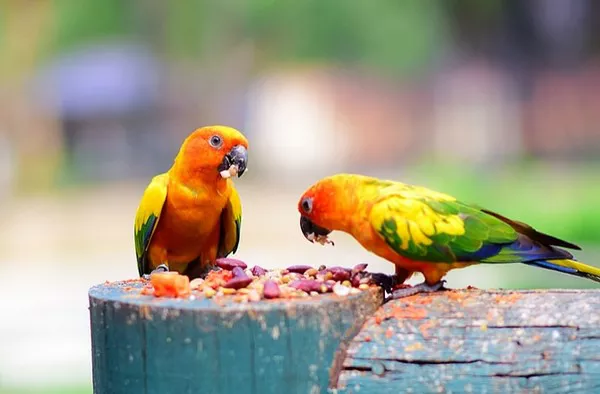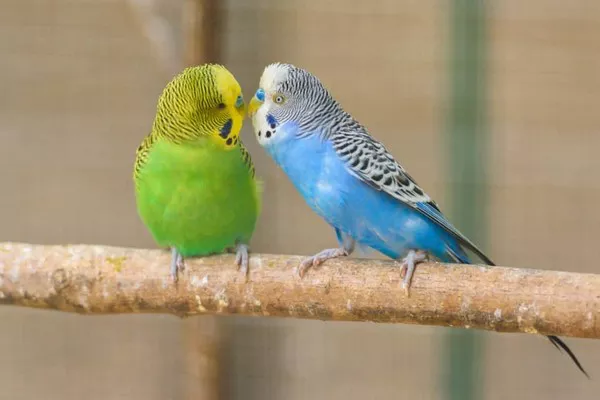African Grey Parrots, known for their remarkable intelligence and striking plumage, are beloved companion birds. To ensure these avian wonders thrive in captivity, it is crucial to provide them with a balanced and nutritionally sound diet. In this comprehensive guide, we will explore the essential components of an African Grey Parrot‘s diet and answer the fundamental question: What can an African Grey Parrot eat?
1. The Natural Diet of African Grey Parrots
Understanding the natural diet of African Grey Parrots is essential for providing them with optimal nutrition in captivity. In the wild, African Greys primarily feed on a diverse range of foods. Their diet typically consists of fruits, vegetables, nuts, seeds, and occasionally, insects. These birds are highly adaptable, foraging in their native habitats for various foods based on seasonal availability.
2. Fruits: A Delicious and Nutritious Option
Fruits are a significant component of an African Grey Parrot’s diet. They provide essential vitamins, minerals, and antioxidants that promote overall health. Some suitable fruits for African Greys include apples, pears, grapes, and berries. However, be cautious with high-sugar fruits like mangoes, as excessive sugar consumption can lead to health issues. It is vital to provide a balanced variety of fruits to meet their dietary needs.
3. Vegetables: A Vital Source of Nutrients
African Grey Parrots can benefit from an assortment of vegetables. These provide essential vitamins, especially vitamin A, which is crucial for maintaining healthy skin and feathers. Dark, leafy greens like kale, spinach, and Swiss chard should be a part of their diet. Carrots, sweet potatoes, and broccoli are also excellent options, offering a variety of nutrients and flavors.
4. Nuts: A Healthy Fat Source
Nuts are an energy-dense food that should be a part of an African Grey Parrot’s diet. They are a source of healthy fats and protein, essential for maintaining body weight and muscle strength. Suitable nuts for these birds include almonds, walnuts, and pecans. However, nuts should be provided in moderation due to their high-fat content.
5. Seeds: A Staple for African Grey Parrots
Seeds are a traditional component of an African Grey Parrot’s diet, and they enjoy eating them. However, seeds alone are not sufficient to meet their nutritional needs. A diet primarily consisting of seeds can lead to obesity and other health problems. Therefore, seeds should be offered in limited quantities and as part of a balanced diet.
6. Protein: The Role of Insects and Legumes
Insects and legumes can provide essential protein in an African Grey Parrot’s diet. In the wild, they often consume insects, which are rich in protein. In captivity, you can offer them small mealworms or crickets as an occasional treat. Legumes, such as lentils and chickpeas, are also an excellent source of plant-based protein and can be included in their diet.
7. The Importance of Pellets
Pelleted diets have gained popularity in avian nutrition due to their convenience and balanced nutrition. High-quality pellet brands designed for African Grey Parrots provide a well-rounded mix of nutrients. Pellets should make up a significant portion of their diet, typically around 60-70%. However, they should be complemented with fresh fruits, vegetables, and other food items to offer variety.
8. Calcium and Grit: Supporting Bone Health
Calcium is essential for maintaining healthy bones and egg production in female African Grey Parrots. Cuttlebone, calcium blocks, and crushed eggshells can be provided as supplemental sources of calcium. Grit, which is small, hard particles, is not necessary for these birds. In fact, overconsumption of grit can lead to digestive issues, so it is best avoided.
9. Hydration Matters
Water is a fundamental component of any diet, and African Grey Parrots are no exception. Fresh, clean water should always be available to these birds. Make sure to change their water daily to prevent contamination and ensure their hydration needs are met.
10. Toxic Foods to Avoid
As much as it’s important to know what African Grey Parrots can eat, it’s equally crucial to be aware of foods that are toxic to them. Some of the foods to avoid include chocolate, caffeine, alcohol, avocados, and foods high in salt and sugar. These can be harmful and even fatal to your parrot if ingested.
11. The Role of Variety
Variety is key to providing a well-rounded and nutritionally balanced diet for African Grey Parrots. Offering a diverse selection of foods helps prevent boredom and encourages them to try new things. Remember that each parrot may have individual preferences, so it’s essential to observe their eating habits and adapt their diet accordingly.
12. Monitoring Health and Dietary Adjustments
Regularly monitoring your African Grey Parrot’s health is essential. Changes in appetite, behavior, or droppings can indicate potential health issues. If you notice any concerning signs, consult with an avian veterinarian who can provide guidance on adjusting their diet to address specific health concerns.
13. Conclusion: Nurturing Healthy and Happy African Grey Parrots
In conclusion, understanding the dietary needs of African Grey Parrots is vital to ensuring their health and happiness in captivity. Their diet should consist of a balanced combination of fruits, vegetables, nuts, seeds, and the occasional protein source. High-quality pellets can serve as a foundational part of their diet, but variety is essential. By offering a diverse selection of foods and carefully monitoring their health, you can provide your African Grey Parrot with a nutritious and satisfying diet that will contribute to a long and fulfilling life as your cherished companion. Always remember, “What can an African Grey Parrot eat” is not just a question but a responsibility to ensure their well-being.
Related Topics:
Why Are African Grey Parrots So Smart? Birds Advice
Do all African grey parrots have great talking abilities?
A Pricing Guide to African Grey Parrots
























